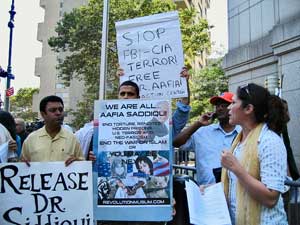Pakistani imprisoned in U.S.
Protesters demand: ‘Free Aafia Siddiqui!’
By
Heather Cottin
Published Sep 11, 2008 9:22 PM
U.S. troops in Afghanistan shot Dr. Aafia Siddiqui and took her into custody in
July. She lies in solitary confinement in the Manhattan Detention Center, with
an open scar from her sternum to her lower abdomen. She has not seen her
lawyer, Elizabeth Fink, because if she leaves her cell she faces an
excruciating strip search.
|
New York’s Pakistani community protests
treatment of jailed Dr. Aafia Siddiqui.
WW photo: Heather Cottin
|
Aafia Siddiqui is a 36-year-old Pakistani national who is a graduate of MIT and
holds a Ph.D. in neuroscience from Brandeis University. On a visit home to
Karachi in 2003, she was disappeared along with her three children. Her family
believes the U.S. government captured, tortured and incarcerated her.
The U.S. government claims Siddiqui is an Al Qaeda terrorist. Federal officials
deny knowledge of her whereabouts for the last five years. But on July 17, U.S.
troops arrested her outside the governor’s office in Afghanistan’s
Ghazni province after police searched her handbag and allegedly found documents
on making explosives as well as descriptions of New York City landmarks. This
story is at odds with the one the Afghan police tell. According to the Afghan
officials, Siddiqui was arrested with maps of Ghazni, a city in central
Afghanistan, including one of the governor’s house.
When U.S. troops requested Siddiqui be handed over to them, Afghan police
refused, so U.S. soldiers disarmed them. The U.S. troops, “thinking that
she had explosives and would attack them as a suicide bomber, shot her and
arrested her.” The U.S. troops claimed she somehow managed to grab an M-4
rifle in a police station and shot at them. (Reuters, Aug. 14)
Human rights groups said they believe Dr. Siddiqui had been secretly detained
since 2003, much of the time in U.S. custody at the Bagram Air Base in
Afghanistan. Dr. Siddiqui’s 12-year-old son is still in prison in
Afghanistan. No one knows where her two youngest children are.
“We believe Aafia has been in custody ever since she disappeared,”
said one of her lawyers, Elaine Whitfield Sharp. (New York Times, Aug. 5)
In Pakistan and the U.S., scores of protesters have condemned the detention and
torture of Siddiqui and demanded her release. If there was to be a trial,
Pakistanis claim that, “She should have faced a court of law here in her
own country.” (Daily Times, Pakistan, Aug. 11)
Pakistan has been a client state of the U.S. for decades. Ex-dictator Musharraf
allowed the U.S. and NATO to bomb civilians in its northern provinces, along
with permitting the arrest, disappearance and detention of thousands of
Pakistanis. Many Pakistanis are enraged over the U.S. claims of
extraterritorial jurisdictions, which violate international laws.
After Dr. Siddiqui was shot, she was flown to the U.S. in the custody of FBI
agents, in agony and confused. Her lawyer, Elizabeth Fink, explained at a trial
on Sept. 4 in Manhattan that Dr. Siddiqui could not appear for trial because
the strip search she must undergo each time she leaves her cell is physically
unbearable. When Fink last saw her, on Aug. 11, Dr. Siddiqui was disoriented
and begged Fink to send food she was given to her son in his prison in
Afghanistan.
Hundreds came to the trial on Sept. 4 and gathered afterward to protest the
unjust treatment of Dr. Siddiqui. Chanting, “Free, Free Aafia
Siddiqui!” Pakistani, African-American and north American speakers called
for an end to CIA torture prisons in Pakistan, Iraq, Afghanistan,
Guantánamo in Cuba, and Somalia. They denounced the policies of the U.S.
that have placed this young mother literally in the crosshairs of U.S.
imperialism.
Articles copyright 1995-2012 Workers World.
Verbatim copying and distribution of this entire article is permitted in any medium without royalty provided this notice is preserved.
Workers World, 55 W. 17 St., NY, NY 10011
Email:
[email protected]
Subscribe
[email protected]
Support independent news
DONATE


